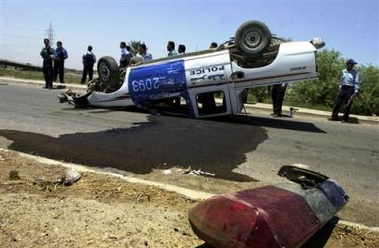|
Iraq car bombs kill Shiite lawmaker, 2 GIs
(Agencies)
Updated: 2005-06-29 08:36
Bombs killed Iraq's oldest legislator and two American soldiers Tuesday on the first anniversary of Iraq's sovereignty — a day the president described as "blessed" despite the persistent violence.
More than a dozen Iraqis also were killed and U.S. and Iraqi troops launched Operation Sword aimed at communities along the Euphrates River, their third major anti-insurgency campaign in Anbar province.
The campaigns have failed to stem a Sunni-dominated insurgency that has killed more than 1,360 people — mostly civilians and Iraqi forces — since Prime Minister Ibrahim al-Jaafari announced his Shiite-dominated government April 28.

Iraqi police gather around an overturned police truck after unidentified gunmen opened fire from another vehicle killing one and injuring at least two others north of Baghdad, Iraq, Tuesday June 28, 2005.[AP] |
President Jalal Talabani nevertheless praised the anniversary of the official transfer of soverneity to the Iraqis because it led to the Jan. 30 election, the country's first free balloting in decades.
"This is a blessed day which saw the restoration of independence and national sovereignty," Talabani said after meeting U.S. and British envoys. "But we think that the restoration of independence started after the epic, the legend, of the elections."
Those elections, however, were boycotted by the vast majority of Sunni Arabs — either because of unwillingness or fear of the insurgency they now dominate.
Relentless attacks since al-Jaafari's government took office have sparked an escalation of sectarian tensions and fears of civil war.
National Assembly legislator Sheik Dhari Ali al-Fayadh, his son, and two bodyguards were killed when a suicide car bomber rammed his vehicle into theirs as they traveled to parliament from their farm in Rashidiya, 20 miles northeast of Baghdad.
Al-Fayadh, a Shiite in his late 80s, was the eldest member of the new parliament and had acted as temporary speaker. He belonged to the country's largest Shiite political party, the Supreme Council of the Islamic Revolution in Iraq, the senior partner in the governing coalition.
It marked the second political assassination in a week, coming after the June 22 killing of a prominent Sunni Arab who had been a candidate to join a committee drafting Iraq's constitution.
Al-Qaida in Iraq, which has declared war on Shiites, claimed responsibility for al-Fayadh's assassination on an Islamic Web site. The statement's authenticity could not be verified.
Talabani said the country would not be deterred by political assassinations and its security forces were working to eradicate the insurgency.
"We think that the Iraqi forces, police and army, have managed to clear many areas of terrorists and scored successes, but they are still at the beginning and will continue working. We do not doubt that the rebels will also try to retaliate. Their tactics are well-known such as car bombs and assassinations of all whom they do not like," Talabani said.
Efforts to include more Sunni Arabs in the political process suffered another setback Tuesday when parliament again postponed setting up an expanded committee to draft the constitution — which must be ready by Aug. 15 so as to be approved by referendum in October.
The postponement came after the committee said Sunni leaders, who nominated 15 representatives for the 71-member body, failed to endorse the list. Some objections also arose over candidates who allegedly were once senior members of Saddam Hussein's outlawed Baath party.
"This is a serious issue that hinders the political process," Sunni Arab legislator Abdul-Rahman al-Noami said of the accusations. "We have a short time ahead of us and we shouldn't focus on this. Why are they bringing this up now?"
Asked about the development, Talabani said although "we are strongly eager that the Sunni brothers be represented in the constitution committee" they should "not have one leg in the rebellion and another leg in the political process."
Also Tuesday, a U.S. soldier died in a suicide car bomb blast in Balad, 50 miles north of Baghdad, and another soldier was killed by a car bomb in Tikrit, the military said. At least 1,743 members of the U.S. military have died since the war began in 2003, according to an Associated Press count.
Five people were killed in a car bomb explosion in Baqouba, north of Baghdad, police said.
In Musayyib, south of Baghdad, a policeman was killed when a suicide bomber wearing an explosive-laden belt blew himself up at a checkpoint, police said.
In Kirkuk, a suicide car bomber slammed into a convoy carrying traffic police chief Brig. Gen. Salar Ahmed, killing one of his bodyguards and a civilian, police said.
American soldiers allegedly killed an Iraqi news executive when he did not pull over as an American convoy passed in Baghdad, said Dr. Muhanad Jawad of Yarmouk Hospital. Ahmed Wael Bakri worked as a director at al-Sharqiya TV.
The U.S. military said they were investigating. Bakri was the third Iraqi journalist allegedly killed in similar incidents in the past week.
|